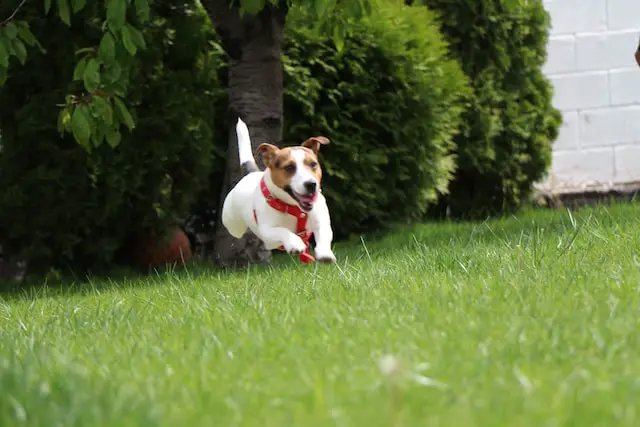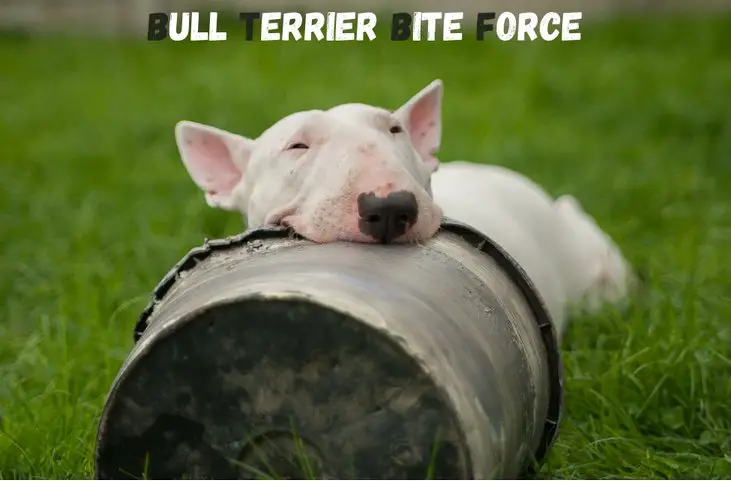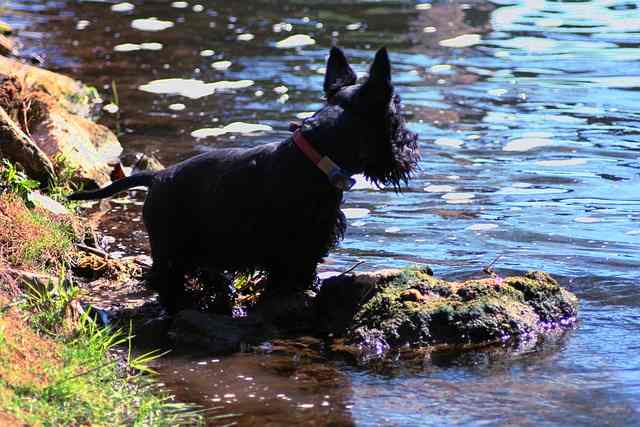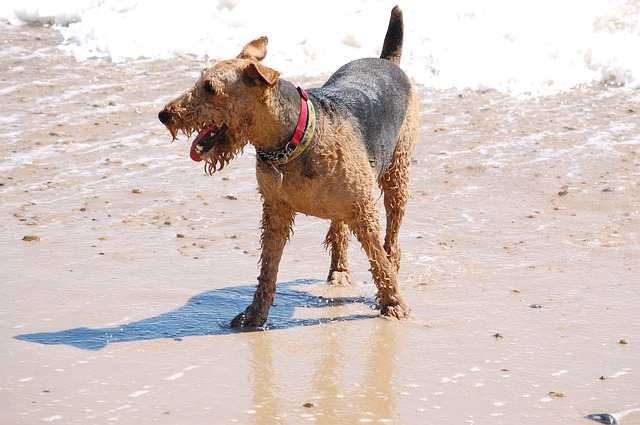Why does my Jack Russell follow me everywhere? A shadow dog!

If you’re a proud owner of a Jack Russell Terrier, you may have noticed a constant, yet endearing presence by your side. Your furry friend follows you everywhere, from room to room, never wanting to be too far away.
You might find yourself tripping over them in the kitchen, stepping over them in the hallway, or even having them accompany you to the bathroom! It’s a behavior that can be both amusing and perplexing.
But why does your Jack Russell exhibit this unwavering devotion to be by your side at all times? In this article, we will explore the intriguing world of Jack Russell’s behavior and delve into the probable causes behind their clingy nature.
From their inherent traits to the role of the owner’s influence, we’ll uncover the reasons behind why does your Jack Russell Follow you everywhere? So, let’s unravel the mystery of this faithful and ever-present companion while gaining insights into their unique behavior.
Why are Jack Russell Terriers so clingy?
Jack Russell Terriers, known for their hunting and working background, possess a unique instinct to stay close to their owners.
Bred for independence, intelligence, and courage, these energetic terriers may exhibit clingy behavior, seeking human companionship and guidance.
Factors such as genetics, socialization, and early life experiences can all contribute to their clingy nature.
Hunting and Working Background
Jack Russell Terriers have a rich hunting and working background that could explain their inclination to stay close to their owners.
Originally bred in the 19th century by Reverend John Russell in England, these terriers were used to assist in small game hunting, such as foxes and rodents. Their keen senses, high energy, and tenacity made them valuable assets in hunting activities.
As hunting dogs, Jack Russell Terriers were trained to work closely with their human handlers, often requiring them to stay in close proximity to receive commands, provide assistance in tracking, and participate in capturing prey.
Breeding and Genetics
The breed’s history and purpose may have influenced their behavior, including their tendency to form strong bonds with their owners.
Jack Russell Terriers were bred for their independent and assertive nature, as well as their intelligence and courage. These traits could contribute to their clingy behavior as they naturally seek human companionship and guidance.
Additionally, genetics may play a role in their attachment tendencies, with certain temperament and attachment traits being passed down through generations of breeding.
Socialization and Early Life Experiences
Socialization and early life experiences can significantly impact a Jack Russell Terrier’s behavior. Proper socialization during their formative months, including bonding with their littermates and human caregivers, can shape their behavior as adults.
Early positive experiences with humans, other animals, and environments can help them develop healthy social skills and independence.
Conversely, lack of socialization or early trauma, such as separation from their littermates or negative experiences with humans, can result in clingy behavior as they seek security and reassurance from their owners.
Examples of Clingy Behavior in Jack Russell Terriers

Clingy behavior in Jack Russell Terriers can manifest in various ways, and understanding these examples can help owners identify and manage such behaviors in their furry companions.
Velcro Dog Syndrome: Jack Russell Terriers are known to exhibit “Velcro Dog Syndrome,” where they want to be constantly by their owner’s side.
They may follow their owners around the house, sit on their laps, or demand physical contact, such as sitting or lying on their owner’s feet. This behavior can be endearing, but it can also become excessive and interfere with the owner’s daily activities.
Separation Anxiety: Jack Russell Terriers are known to be prone to separation anxiety, a condition where they become excessively anxious or distressed when separated from their owners.
This can result in destructive behavior, excessive barking or whining, pacing, and other signs of anxiety when left alone. Jack Russell Terriers may also become overly clingy and seek constant reassurance from their owners when they are present.
Need for Attention
Jack Russell Terriers are highly energetic and social dogs that thrive on human interaction and attention.
They may constantly seek attention from their owners, demanding to play, cuddle, or engage in activities together. They may display behaviors such as nudging, pawing, or barking to get attention, and can become persistent and clingy if their attention-seeking behaviors are not addressed.
Bonding and Attachment
Jack Russell Terriers are known to form strong bonds and attachments with their owners. They may become deeply attached to their primary caregiver and exhibit clingy behavior to maintain close proximity and contact.
They may also show a preference for their owner’s presence over other family members or pets, and become anxious or distressed when their owner is not around.
Reliance on Routine
Jack Russell Terriers thrive on routine and structure, and any disruptions to their established routines can trigger clingy behavior.
For example, changes in their owner’s schedule, absence of familiar individuals or pets, or changes in the home environment can lead to increased clinginess as the dog seeks reassurance and stability from their owner.
Anxiety and Fear
Jack Russell Terriers can be prone to anxiety and fear, which can manifest as clingy behavior.
They may seek reassurance and comfort from their owners when they are anxious or scared, and may exhibit clingy behaviors as a coping mechanism to alleviate their anxiety or fear.
Common questions about Jack Russell Terriers’ clingy behavior
In this section, I will answer some of the most commonly asked questions about Jack Russell Terrier’s clingy behavior.
Why does my Jack Russell follow me to the bathroom?
It’s not uncommon for Jack Russell Terriers, or any dog for that matter, to exhibit “velcro dog” behavior and follow their owners to the bathroom. There can be several reasons why your Jack Russell Terrier may exhibit this behavior.
One possible reason is separation anxiety. Dogs are social animals and form strong bonds with their owners. If your Jack Russell Terrier has separation anxiety, they may feel anxious or stressed when left alone, even for a short period of time. Following you to the bathroom could be their way of seeking reassurance and feeling more secure.
Another reason could be attention-seeking behavior. Jack Russell Terriers are known for their high energy levels and desire for attention. They may follow you to the bathroom as a way to seek attention, especially if they feel they are not getting enough during other times of the day. By following you to the bathroom, they may be hoping to engage with you or get your attention.
Additionally, Jack Russell Terriers are known for their strong bond with their owners. They are often referred to as “velcro dogs” because of their tendency to want to be close to their humans at all times. Following you to the bathroom could be a manifestation of this strong bond and their desire to be near you, even in the most private moments.
It’s also important to consider the breed’s history and instincts. Jack Russell Terriers were originally bred for hunting and working alongside humans. Their natural inclination to be close to their human handlers may still be present in their behavior today, including following you to the bathroom.
In some cases, your Jack Russell Terrier may simply be curious. Dogs are naturally curious creatures, and the bathroom is a place that smells different and has different sounds and activities. Your Jack Russell Terrier may be intrigued by these differences and want to investigate or simply be near you while you’re in there.
Overall, the behavior of Jack Russell Terriers following their owners to the bathroom can be influenced by a combination of factors, including separation anxiety, attention-seeking behavior, their strong bond with their owners, breed instincts, and natural curiosity.
Understanding these possible reasons can help you better understand and manage your Jack Russell Terrier’s behavior in the bathroom. If you have concerns about your dog’s behavior, it’s always best to consult with a qualified veterinarian or professional dog trainer for personalized advice.
Do Jack Russell Terriers get attached to their owners?
As a breed known for their high energy, intelligence, and strong personality, Jack Russell Terriers are often praised for their loyalty and devotion to their owners. But do they really get attached to their owners?
The answer is yes! Jack Russell Terriers are known to form strong bonds and attachments with their human caregivers, and their clingy behavior is often a reflection of this attachment.
One of the key reasons why Jack Russell Terriers get attached to their owners is their history as hunting and working dogs. Originally bred in England by Reverend John Russell for their hunting abilities, Jack Russell Terriers were trained to work closely with their human handlers.
They would accompany hunters in the field, assisting them in hunting small game like foxes and rodents. This close working relationship between the dog and the handler fostered a strong bond and dependency on their human companion.
This working heritage has been passed down through generations, and today’s Jack Russell Terriers still retain their natural instinct to stay close to their owners. They are known for their “Velcro Dog” behavior, where they want to be constantly by their owner’s side.
They may follow their owners around the house, sit on their laps, or demand physical contact, such as sitting or lying on their feet. This clingy behavior is a manifestation of their attachment to their owners and their desire to be near them at all times.
In addition to their breeding and working history, Jack Russell Terriers are also known for their strong attachment and loyalty towards their human caregivers due to their temperament and personality.
They are known to be highly social, affectionate, and people-oriented dogs. They thrive on human interaction and attention, and they form strong emotional bonds with their owners.
They enjoy being part of the family and consider their owners as their pack. As pack animals, they have a natural inclination to stay close to their pack leader, which is their owner in this case.
Early life experiences and socialization also play a role in the attachment of Jack Russell Terriers to their owners.
Puppies that are properly socialized and have positive experiences with humans during their critical period of development are more likely to develop a secure attachment to their owners.
This includes bonding with their littermates, as well as receiving love, care, and attention from their human caregivers. These early experiences shape their perception of humans and influence their attachment style.
It’s important to note that not all Jack Russell Terriers will exhibit clingy behavior towards their owners. Dogs, like humans, have individual personalities and temperaments that can vary from one dog to another.
Some Jack Russell Terriers may be more independent and less clingy, while others may be more reliant on their owners for emotional support and companionship.
Do they have a favorite person?

Yes, Jack Russell Terriers are known to have a favorite person or a preferred human within their household. While they are generally sociable and affectionate with all members of their family, they may form a stronger bond with one particular person.
The bond between a Jack Russell Terrier and their favorite person is typically formed through a combination of factors. These can include the amount of time and attention the person spends with the dog, the quality of interactions, and the level of care provided.
For example, if one person in the household is consistently responsible for feeding, grooming, training, and engaging in playtime with the Jack Russell Terrier, the dog may develop a stronger attachment to that person.
Furthermore, Jack Russell Terriers are known for their ability to read and respond to human emotions and body language. They are highly perceptive and can quickly pick up on cues from their human companions.
If a particular person provides comfort, reassurance, and positive reinforcement to the Jack Russell Terrier during times of stress, fear, or uncertainty, the dog may naturally develop a preference for that person as their trusted source of security and companionship.
It’s important to note that a Jack Russell Terrier’s favorite person may change over time or vary in different situations. For example, if a family member moves away or if the dog is introduced to a new person who provides consistent care and attention, the dog may shift their attachment to a different person.
However, it’s not uncommon for Jack Russell Terriers to form strong and lasting bonds with one particular person, whom they see as their special human.
As responsible pet owners, it’s essential to respect and understand a Jack Russell Terrier’s bond with their favorite person. This includes ensuring that all members of the household provide care, attention, and affection to the dog, and not favoring one person over others.
It’s also important to communicate and coordinate with the dog’s preferred person to ensure that the dog’s needs, such as exercise, training, and socialization, are met consistently.
Do Jack Russell Terriers have separation anxiety?
Yes, Jack Russell Terriers can be prone to separation anxiety, which is a condition where a dog experiences distress and anxiety when separated from their owner or left alone for extended periods of time. Jack Russell Terriers are known for their strong attachment to their human companions, and this can sometimes result in separation anxiety when they are separated from their preferred person or left alone for prolonged periods.
The high energy, intelligent, and social nature of Jack Russell Terriers can contribute to their susceptibility to separation anxiety. They are often described as “velcro dogs” due to their tendency to want to be close to their owner at all times. They form strong emotional bonds with their humans and may become overly dependent on their presence for comfort and security.
When left alone, Jack Russell Terriers with separation anxiety may exhibit various signs of distress, such as excessive barking, howling, destructiveness, digging, pacing, restlessness, and even house soiling. These behaviors can be destructive and distressing for both the dog and the owner, and may also lead to damage to property and disruption to neighbors.
It’s important to note that separation anxiety in Jack Russell Terriers is a behavioral issue that requires patience, understanding, and proper training to address. Punitive measures or scolding the dog may worsen their anxiety and should be avoided. Instead, a positive approach that focuses on desensitization, counter-conditioning, and gradually increasing the dog’s tolerance to being alone can be effective in managing separation anxiety.
Prevention and management strategies for separation anxiety in Jack Russell Terriers include gradually acclimating the dog to being alone through short absences initially, providing plenty of mental and physical stimulation before leaving, using puzzle toys or treat-dispensing toys to keep the dog engaged, and providing a safe and comfortable space for the dog to rest in when alone.
In some cases, professional help from a qualified veterinarian or a certified dog behaviorist may be required to address severe cases of separation anxiety. Medication, such as anti-anxiety medications, may also be recommended in certain cases to help manage the dog’s anxiety.
In conclusion, Jack Russell Terriers can be susceptible to separation anxiety due to their strong attachment to their owners. Understanding the signs, prevention, and management strategies for separation anxiety can help ensure a happy, healthy, and well-adjusted Jack Russell Terrier that can cope with being alone. Seeking professional help if needed is important to provide the best care for a dog with separation anxiety.
Do Jack Russell Terriers need a lot of attention?
Jack Russell Terriers generally require a significant amount of attention due to their energetic and social nature. They are known for their high energy levels, intelligence, and strong attachment to their human companions. Jack Russell Terriers thrive on human interaction and mental stimulation, and they can become bored or anxious if left without sufficient attention and engagement.
As highly social dogs, Jack Russell Terriers crave human interaction and thrive on being a part of their family’s activities. They often form strong bonds with their owners and enjoy spending time with them, whether it’s through playtime, training sessions, or simply being by their side. They can become attached to their preferred person and may seek constant attention and companionship.
In addition to their need for human interaction, Jack Russell Terriers also require mental stimulation to keep their active minds engaged. They are intelligent dogs that enjoy problem-solving, learning, and exploring their surroundings. Without enough mental stimulation, they may become bored or restless, which can lead to destructive behaviors or other undesirable behaviors.
Providing regular exercise, playtime, and training sessions can help fulfill their need for both physical and mental stimulation. Interactive toys, puzzle toys, and treat-dispensing toys can also be beneficial in keeping their minds engaged and preventing boredom.
It’s important to note that Jack Russell Terriers may become anxious or display behavioral issues if they do not receive adequate attention and stimulation. They may resort to undesirable behaviors such as excessive barking, digging, or destructive chewing as a means to cope with their boredom or anxiety.
In conclusion, Jack Russell Terriers generally require a lot of attention due to their social and energetic nature. Regular human interaction, exercise, and mental stimulation are essential for their well-being and can help prevent behavioral issues. Providing them with the attention and engagement they need can result in a happy, well-adjusted Jack Russell Terrier that makes a wonderful companion.
Why does my Jack Russell always stare at me?

It’s not uncommon for Jack Russell Terriers to stare at their owners, and there can be several reasons behind this behavior. Here are some possible explanations:
- Attention-seeking: Jack Russell Terriers are known for their outgoing and attention-seeking nature. They may stare at their owners as a way to demand attention, hoping to elicit a response or engage in playtime or interaction.
- Bonding and attachment: Jack Russell Terriers are known to form strong bonds with their owners. Staring at their owners may be a way for them to express their affection and loyalty, as they seek to establish a closer connection with their beloved human.
- Observation and anticipation: Jack Russell Terriers are highly alert and observant dogs. They may stare at their owners to closely monitor their movements and anticipate their next action, especially if they are anticipating playtime, mealtime, or any other activity that they enjoy.
- Communication: Staring can also be a form of communication for Jack Russell Terriers. They may be trying to convey a specific message or express their emotions, such as hunger, discomfort, or anxiety, through their intense gaze.
- Training and reinforcement: If your Jack Russell Terrier has been trained to make eye contact as part of obedience training, they may stare at you as a learned behavior. They may be seeking positive reinforcement or rewards for maintaining eye contact.
It’s important to observe your Jack Russell Terrier’s body language and overall behavior along with the staring behavior to better understand their intentions. If you have concerns about your Jack Russell Terrier’s behavior, it’s best to consult with a qualified veterinarian or professional dog trainer for guidance and advice.
Do Jack Russell Terriers get jealous easily?
As with any breed, individual Jack Russell Terriers may display jealousy-like behaviors in certain situations, but it’s not necessarily a universal trait for the entire breed. However, Jack Russell Terriers are known to be highly energetic, vocal, and possessive of their toys, food, and attention, which can sometimes be mistaken for jealousy. Here are some points to consider:
- Resource guarding: Jack Russell Terriers can be possessive of their belongings, including toys, food, and their owners’ attention. They may exhibit behaviors such as growling, snapping, or pushing other pets or individuals away when they feel their resources are being threatened or taken.
- High energy and intensity: Jack Russell Terriers are known for their high energy levels and intense personalities. They may become highly vocal or exhibit attention-seeking behaviors when they perceive other pets or individuals receiving more attention than them, which can be interpreted as jealousy.
- Need for attention: Jack Russell Terriers thrive on human interaction and attention. If they feel ignored or left out, they may exhibit behaviors that can be interpreted as jealousy, such as trying to push their way into the spotlight or demanding attention through barking, jumping, or other attention-seeking behaviors.
- Lack of socialization: Jack Russell Terriers that have not been properly socialized with other pets or individuals may exhibit jealousy-like behaviors when they are not accustomed to sharing their owner’s attention or resources.
- Training and reinforcement: It’s important to note that some behaviors labeled as jealousy may have been inadvertently reinforced through training or unintentional rewarding of certain behaviors. For example, if a Jack Russell Terrier displays jealousy-like behaviors and is rewarded with attention or treats, it may reinforce those behaviors over time.
It’s essential to understand that dogs, including Jack Russell Terriers, are complex individuals with their unique personalities and behaviors. If you have concerns about your Jack Russell Terrier’s behavior, it’s best to consult with a qualified veterinarian or professional dog trainer for guidance and advice on how to address and manage any potential jealousy-like behaviors.
Positive reinforcement-based training, proper socialization, and providing ample mental and physical stimulation can all contribute to a well-behaved and emotionally balanced Jack Russell Terrier.
Are Jack Russell Terriers lap dogs?
Jack Russell Terriers are not typically considered lap dogs, as they are known for their high energy levels, independent nature, and hunting instincts. Jack Russell Terriers were originally bred in England for their hunting skills, specifically for tracking and flushing small game, and they have retained those traits in their temperament and behavior.
However, some individual Jack Russell Terriers may enjoy sitting on their owner’s lap or cuddling, but this behavior may not be as common or instinctive in Jack Russell Terriers compared to other small dog breeds that were specifically bred for lap dog characteristics.
Jack Russell Terriers are more known for their active and energetic nature. They have a strong desire to explore, play, and engage in physical activities, such as chasing toys, digging, and running. They have a high prey drive and may have a tendency to chase small animals or exhibit hunting behaviors, which may not make them ideal lap dogs for extended periods of time.
Jack Russell Terriers are independent dogs and may prefer to have their own space and freedom to move around rather than sitting still on a lap for long periods. They are known to be curious, intelligent, and have a strong need for mental stimulation, which may be better fulfilled through interactive play, training, and exercise rather than being lap dogs.
It’s important to remember that every dog is an individual, and some Jack Russell Terriers may have their unique preferences and behaviors. While some Jack Russell Terriers may enjoy sitting on their owner’s lap, it’s not a typical characteristic of the breed as a whole.
It’s essential to understand and respect the natural instincts and temperament of Jack Russell Terriers and provide them with appropriate outlets for their energy and curiosity to ensure they are happy, healthy, and mentally stimulated.
Do Jack Russell Terriers like to be the only dog?

Jack Russell Terriers have a strong prey drive and can be territorial, which may make them less tolerant of other dogs, especially those of the same sex or smaller size. While some Jack Russell Terriers may get along well with other dogs, they are known to have a dominant and independent nature, which may lead to them preferring to be the only dog in the household.
In some cases, Jack Russell Terriers may exhibit aggressive or dominant behavior towards other dogs, especially if they feel threatened or challenged. This can be particularly true if they have not been properly socialized with other dogs from a young age. Therefore, it’s important to introduce Jack Russell Terriers to other dogs gradually and under controlled circumstances, providing positive experiences and reinforcement to promote healthy socialization.
However, it’s worth noting that individual temperament and behavior can vary among Jack Russell Terriers, and some may be more tolerant of other dogs or even enjoy the company of other canine companions. Proper socialization, training, and management can play a crucial role in determining whether a Jack Russell Terrier can live harmoniously with other dogs.
If you are considering adding another dog to a household with a Jack Russell Terrier, it’s essential to carefully monitor their interactions and provide adequate supervision to prevent any potential conflicts.
Consulting with a professional dog trainer or behaviorist may also be beneficial in managing multi-dog households and ensuring the well-being of all pets involved.
How to Stop a Jack Russell Terrier from Following You Everywhere?
Jack Russell Terriers are known for their loyal and affectionate nature, which often leads to them following their owners everywhere they go. While this behavior can be endearing, it may also become excessive and potentially problematic in certain situations.
If you wish to stop your Jack Russell Terrier from constantly following you everywhere, here are some tips that may help:
Set clear boundaries
Establishing clear boundaries with your Jack Russell Terrier is crucial. This means not allowing them to follow you into certain areas of the house or during specific activities, such as going to the bathroom, cooking, or working. Consistently enforce these boundaries and be firm but gentle in communicating to your dog that certain areas or activities are off-limits.
Provide ample mental and physical stimulation

Jack Russell Terriers are intelligent and active dogs that require ample mental and physical stimulation to thrive. Providing regular exercise, playtime, training sessions, and puzzle toys can help keep their minds and bodies engaged, reducing their need to constantly follow you for stimulation.
Practice positive reinforcement training
Training your Jack Russell Terrier to obey basic commands, such as “sit,” “stay,” and “come,” can help redirect their attention and focus away from constantly following you. Use positive reinforcement techniques, such as treats, praise, and rewards, to encourage desired behaviors and discourage clingy behavior.
Create a safe and comfortable space
Providing your Jack Russell Terrier with a designated safe and comfortable space, such as a crate or a designated room, can give them a sense of security and independence. This can help reduce their need to constantly follow you around and allow them to have some alone time.
Gradual desensitization to separation
If your Jack Russell Terrier has separation anxiety and follows you around due to fear of being left alone, gradual desensitization to separation can be helpful.
Start by leaving them alone for short periods of time and gradually increasing the duration over time, while providing positive reinforcement for calm behavior. This can help your dog develop confidence and independence, reducing their need to constantly follow you.
Seek professional help if needed
If your Jack Russell Terrier’s clingy behavior persists despite your efforts, it may be beneficial to seek the guidance of a professional dog trainer or a qualified veterinarian. They can assess your dog’s behavior and provide personalized advice and training strategies to address the issue effectively.
Final thoughts
In conclusion, Jack Russell Terriers are known for their clingy nature and if not dealt with they will follow you everywhere, which can be attributed to a combination of their hunting and working background, breeding and genetics, as well as socialization and early life experiences. Their strong attachment to their owners can result in behaviors such as following their owners everywhere, seeking constant attention, and displaying signs of separation anxiety or jealousy.
Understanding the underlying reasons for their clingy behavior is crucial in managing and addressing it effectively.
By setting clear boundaries, providing ample mental and physical stimulation, practicing positive reinforcement training, creating a safe and comfortable space, and gradually desensitizing them to separation, it is possible to manage and reduce clingy behavior in Jack Russell Terriers.
It is also important to remember that every dog is an individual, and some Jack Russell Terriers may naturally be more independent or less clingy than others. It is essential to consider your dog’s unique personality, temperament, and history when addressing clingy behavior and to seek professional help if needed.
Overall, with patience, consistency, and positive reinforcement, it is possible to strike a balance between fostering a strong bond with your Jack Russell Terrier while also promoting healthy independence and reducing excessive clingy behavior.
By understanding their nature and providing appropriate care and training, you can ensure a happy and fulfilling relationship with your beloved Jack Russell Terrier companion.







